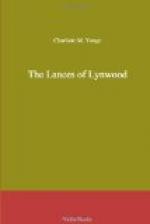“How now, my young cousin!” said Clarenham, in a most irritating tone of indifference—“you forget in what presence you are.”
“I do not,” replied Arthur, fiercely. “Before the Prince, Fulk Clarenham, I declare you a false traitor!—and, if you dare deny it, there lies my gloves!”
Fulk only replied by a scornful laugh, and, addressing the Prince, said, “May I pray of your Grace not to be over severe with my young malapert relation.”
The Captal de Buch spoke: “You do not know what an adversary you have provoked, Fulk! The other day, I met my nephew, little Pierre, with an eye as black as the patch we used to wear in our young days of knight-errantry. ‘What wars have you been in, Master Pierre?’ I asked. It was English Arthur who had fought with him, for mocking at his talking of nothing but his uncle. But you need not colour, and look so abashed, little Englishman!—I bear no more malice than I hope Pierre does—I only wish I had as bold a champion! I remember thine uncle, if he is the youth to whom the Constable surrendered at Navaretta, and of whom we made so much.”
“Too much then, and too little afterwards,” said old Sir John Chandos.
“You do not know all, Chandos,” said the Prince.
“You do not yourself know all, my Lord,” said Arthur, turning eagerly. “Lord de Clarenham has deceived you, and led you to imagine that my uncle wished ill to me, and wanted to gain my lands; whereas it is he himself who wants to have me in his hands to bend me to his will. It is he who has placed traitors in Chateau Norbelle to slay my uncle and deliver him to the enemy; they have already wounded him almost to death”—here Arthur’s lips quivered, and he could hardly restrain a burst of tears—“and they have sent for Sir Oliver de Clisson, the butcher. Gaston will hold out as long as they can, but if you will not send succours, my Lord, he will—will be slain; and kind Gaston too;” and Arthur, unable to control himself any longer, covered his face with his hands, and gave way to a silent suppressed agony of sobs and tears.
“Cheer thee, my boy,” said the Prince, kindly; “we will see to thine uncle.” Then, looking at his nobles, he continued, “It seems that these varlets will allow us no more peace; and since there does in truth appear to be a Knight and Castle in jeopardy, one of you had, perhaps, better go with a small band, and clear up this mystery. If it be as the boy saith, Lynwood hath had foul wrong.”
“I care not if I be the one to go, my Lord,” said Chandos; “my men are aver kept in readiness, and a night’s gallop will do the lazy knaves all the good in the world.”
Arthur, brushing off the tears, of which he was much ashamed, looked at the old Knight in transport.
“Thanks, Chandos,” said the Prince; “I would commit the matter to none so willingly as to you, though I scarce would have asked it, considering you were not quite so prompt on a late occasion.”




